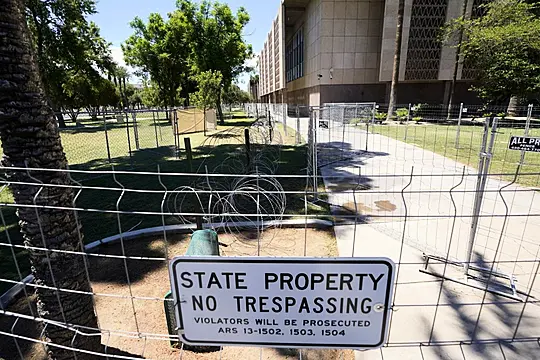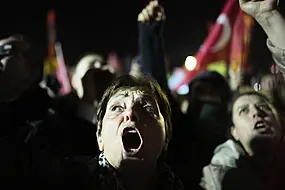The fall of Roe v. Wade shifted the battleground over abortion to courthouses around the US, as one side sought quickly to put statewide bans into effect and the other tried to stop or at least delay such measures.
The US Supreme Court’s decision Friday to end constitutional protection for abortion opened the gates for a wave of litigation from all sides.
Many of the court cases will focus on “trigger laws”, adopted in 13 states in anticipation of the ruling and designed to take effect swiftly.
Lawsuits could also target old anti-abortion laws that were left on the books and went unenforced under Roe.
Newer abortion restrictions that were put on hold pending the Supreme Court ruling have also started to come back into play.

“We’ll be back in court tomorrow and the next day and the next day,” Nancy Northup, president and chief executive of the Centre for Reproductive Rights, which argued the case that resulted in the high court ruling, said last Friday.
In Louisiana on Monday, a judge in New Orleans, a liberal city in a conservative state, temporarily blocked enforcement of the state’s trigger-law ban on abortion, after abortion rights activists argued that it is unclear.
The ruling is in effect pending a July 8 hearing.
At least one of the state’s three abortion clinics said it would resume performing procedures on Tuesday.
“We’re going to do what we can,” said Kathaleen Pittman, administrator of Hope Medical Group for Women, in Shreveport.
“It could all come to a screeching halt.”
As the chief legal officer for our State, I will continue defending Louisiana’s #ProLife laws and working to ensure the health and safety of women and their babies. #lagov #lalege #Dobbs
— AG Jeff Landry (@AGJeffLandry) June 24, 2022
Louisiana attorney general Jeff Landry, a Republican and staunch abortion opponent, vowed to fight the judge’s ruling and enforce the law.
“We would remind everyone that the laws that are now in place were enacted by the people through State Constitutional Amendments and the LA Legislature, which the citizens elect representatives,” Mr Landry tweeted.
“We are fully prepared to defend these laws in our state courts, just as we have in our federal courts.”
Also Monday, abortion rights advocates asked a Florida judge to block a new law there that bans the procedure after 15 weeks with some exceptions and is set to take effect this week.
And a hearing was scheduled for Monday afternoon in Utah, where Planned Parenthood challenged a trigger law there that contains narrow exceptions.
Abortion rights activists also went to court Monday to try to fend off restrictions in Texas, Idaho, Kentucky and Mississippi, the state at the centre of the Supreme Court ruling, while the American Civil Liberties Union of Arizona filed an emergency motion there on Saturday seeking to block a 2021 law they worry can be used to halt all abortions.
In Friday’s ruling, the Supreme Court left it to the states to decide whether to allow abortion.
“The expectation is that this will result in years of legislative and judicial challenges,” said Jonathan Turley, a professor at the George Washington University law school.

As of Saturday, abortion services had stopped in at least 11 states, either because of state laws or confusion over them.
In some cases, the lawsuits may only buy time.
Even if courts block some restrictions from taking hold, politicians in many conservative states could move quickly to address any flaws cited.
That is likely to be the case in Louisiana.
The plaintiffs in the lawsuit filed in state court do not deny that the state can now ban abortion.
Instead, they contend Louisiana now has multiple, conflicting trigger mechanisms in the law.
They also argue that state law is unclear on whether it bans an abortion prior to a fertilised egg implanting in the uterus.
And while the law provides an exception for “medically futile” pregnancies in cases of foetuses with lethal abnormalities, the plaintiffs noted the law gives no definition of the term.
Around the country, challenges to other trigger laws could be made on the grounds that the conditions to impose the bans have not been met, or that it was improper for a past legislature to bind the current one.
Laura Herner, a professor at Mitchell Hamline School of Law in St Paul, Minnesota, said other challenges might call into question whether state laws sufficiently and clearly allow for exceptions to protect the life or health of a pregnant woman.
Now that the high court has ruled that the US Constitution does not guarantee the right to an abortion, abortion rights supporters will make the case that their state constitutions protect such a right.
A judge heard arguments on that issue Monday in Florida, where lawyers tried to block a new law from going into effect on Friday.
The ban beyond 15 weeks has exceptions to save the pregnant woman’s life or prevent physical harm or in cases where the foetus has a fatal abnormality.
The ACLU of Florida argued the law violates the Florida Constitution.
James Bopp Jr, general counsel for the National Right to Life Committee, said the wave of suits from abortion rights advocates is not surprising.
“We know that he abortion industry has basically unlimited funds, and its allies have basically unlimited funds, and of course they’re fanatical about abortion on demand throughout pregnancy,” Mr Bopp said in an interview.
But he said that that the Supreme Court ruling should preclude abortion rights supporters from prevailing in any federal challenges.
And he called efforts based on state constitutions “fanciful”.
#RoevWade transformed America. For two generations, it protected women’s freedom and health.
Today’s decision in Dobbs reverses that progress, taking us backwards almost 50 years. It leaves women less free and at greater risk of suffering harm to their health during pregnancy.— Attorney General Josh Kaul (@WisDOJ) June 24, 2022
Still other cases could be filed as states try to sort out whether abortion bans in place before Roe was decided, sometimes referred to as “zombie laws”, apply now that there is no federal protection for abortion.
For instance, Wisconsin passed a law in 1849 banning abortions except to save the life of the mother.
Attorney General Josh Kaul, a Democrat, said he does not believe it is enforceable.
Abortion opponents have called on politicians to impose a new ban.
In the meantime, Planned Parenthood of Wisconsin said it immediately suspended all abortions.







